Rwanda to Darfur, an unbroken discord
Twelve years ago, Rwanda, sub-Saharan Africa, exploded in an orgy of racial violence, intertribal hatred and killing that some western observers have called the worst genocide since WWII.
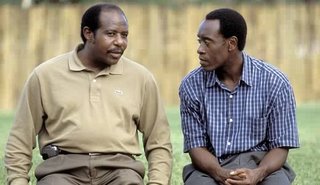 On April 6, 1994, the killing began, 2 weeks later - April 21 - the International Red Cross estimated tens, perhaps hundreds of thousands of Rwandans were dead. U.N. officials refused to call it genocide.
On April 6, 1994, the killing began, 2 weeks later - April 21 - the International Red Cross estimated tens, perhaps hundreds of thousands of Rwandans were dead. U.N. officials refused to call it genocide.
By the end of 100 days, 900,000 Rwandans had been killed – most, by the Rwandan Armed Forces (FAR) joined by Hutu militia (the interahamwe) armed with machetes.
The events in Rwanda in 1994 were dramatized in the now iconic movie Hotel Rwanda, (2004), the story of a small group of refugees (1260 altogether) gathered in the luxury Dutch Hotel, The Mille Collines (view satellite image). They were under the protection of a Rwandan hotel manager, Paul Rusesabagina.
Today Rusesabagina - an ethnic Hutu - and his family live in Belgium. He is an outspoken witness to the massacre in Rwanda. You can listen to his account of that siege. Vilified by some and praised by others, this quiet man, An Ordinary Man, according to his autobiography (excerpt) by the same name, has had his life threatened and, quixotically, he is routinely mentioned as a presidential prospect in Rwandan political circles.
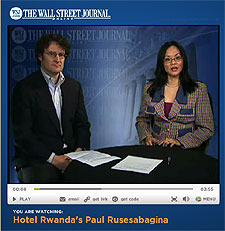 For all his notoriety and his perspicacity, Rusesabagina may be just the face a blind, predominantly white, western culture imposes on tragedies like the one in Rwanda; or he may be a forbearing force for real change and ultimately, tolerance – time will tell.
For all his notoriety and his perspicacity, Rusesabagina may be just the face a blind, predominantly white, western culture imposes on tragedies like the one in Rwanda; or he may be a forbearing force for real change and ultimately, tolerance – time will tell.
Today there is another “genocide” occurring in Africa, in Darfur. The names may be different and to some extent, so too are the circumstances. However, the underlying causes are the same: grinding poverty, lack of education, unrelenting draught and western indifference spawned by centuries of mistrust and colonial arrogance.
 Darfur has the potential to be an even greater disaster than Rwanda, as if that makes it somehow worse. Yet the circumstances, which surround the killing in Darfur, are no different than they were in 1994. The intolerance that unleashes such a rampaging murderous storm lies, at its heart, in the matrix that is North Africa and south sub-Saharan Africa.
Darfur has the potential to be an even greater disaster than Rwanda, as if that makes it somehow worse. Yet the circumstances, which surround the killing in Darfur, are no different than they were in 1994. The intolerance that unleashes such a rampaging murderous storm lies, at its heart, in the matrix that is North Africa and south sub-Saharan Africa.
Egyptian/Saharan Africa has been, for a very great many centuries, the broker between Roman/European, western civilization and the resources and labor of Central-Southern Africa. Millennia of African on African violence and discontinuity have created a deep, abiding distrust between north and south. It is a chasm that threatens to divide the continent as surely, as the Great Rift Valley is certain to divide it east from west. The developed nations of Europe, Asia and the Americas may yet learn to hear Africa, but not until our hearts understand Africa, will her dream of a united continent begin.
by Harlan Weikle
Greener Magazine
keywords:: DARFUR AFRICA RWANDA GENOCIDE REFUGEES
resources:: SaveDarfu.org Endorses a Call for UN Peacekeepers in Chad
Coalition Also Calls for Concrete Action in Darfur Following African Union Summit
 On April 6, 1994, the killing began, 2 weeks later - April 21 - the International Red Cross estimated tens, perhaps hundreds of thousands of Rwandans were dead. U.N. officials refused to call it genocide.
On April 6, 1994, the killing began, 2 weeks later - April 21 - the International Red Cross estimated tens, perhaps hundreds of thousands of Rwandans were dead. U.N. officials refused to call it genocide.By the end of 100 days, 900,000 Rwandans had been killed – most, by the Rwandan Armed Forces (FAR) joined by Hutu militia (the interahamwe) armed with machetes.
The events in Rwanda in 1994 were dramatized in the now iconic movie Hotel Rwanda, (2004), the story of a small group of refugees (1260 altogether) gathered in the luxury Dutch Hotel, The Mille Collines (view satellite image). They were under the protection of a Rwandan hotel manager, Paul Rusesabagina.
Today Rusesabagina - an ethnic Hutu - and his family live in Belgium. He is an outspoken witness to the massacre in Rwanda. You can listen to his account of that siege. Vilified by some and praised by others, this quiet man, An Ordinary Man, according to his autobiography (excerpt) by the same name, has had his life threatened and, quixotically, he is routinely mentioned as a presidential prospect in Rwandan political circles.
 For all his notoriety and his perspicacity, Rusesabagina may be just the face a blind, predominantly white, western culture imposes on tragedies like the one in Rwanda; or he may be a forbearing force for real change and ultimately, tolerance – time will tell.
For all his notoriety and his perspicacity, Rusesabagina may be just the face a blind, predominantly white, western culture imposes on tragedies like the one in Rwanda; or he may be a forbearing force for real change and ultimately, tolerance – time will tell.Today there is another “genocide” occurring in Africa, in Darfur. The names may be different and to some extent, so too are the circumstances. However, the underlying causes are the same: grinding poverty, lack of education, unrelenting draught and western indifference spawned by centuries of mistrust and colonial arrogance.
 Darfur has the potential to be an even greater disaster than Rwanda, as if that makes it somehow worse. Yet the circumstances, which surround the killing in Darfur, are no different than they were in 1994. The intolerance that unleashes such a rampaging murderous storm lies, at its heart, in the matrix that is North Africa and south sub-Saharan Africa.
Darfur has the potential to be an even greater disaster than Rwanda, as if that makes it somehow worse. Yet the circumstances, which surround the killing in Darfur, are no different than they were in 1994. The intolerance that unleashes such a rampaging murderous storm lies, at its heart, in the matrix that is North Africa and south sub-Saharan Africa.Egyptian/Saharan Africa has been, for a very great many centuries, the broker between Roman/European, western civilization and the resources and labor of Central-Southern Africa. Millennia of African on African violence and discontinuity have created a deep, abiding distrust between north and south. It is a chasm that threatens to divide the continent as surely, as the Great Rift Valley is certain to divide it east from west. The developed nations of Europe, Asia and the Americas may yet learn to hear Africa, but not until our hearts understand Africa, will her dream of a united continent begin.
by Harlan Weikle
Greener Magazine
keywords:: DARFUR AFRICA RWANDA GENOCIDE REFUGEES
resources:: SaveDarfu.org Endorses a Call for UN Peacekeepers in Chad
Coalition Also Calls for Concrete Action in Darfur Following African Union Summit
- Nov. 30 WASHINGTON, DC – The Save Darfur Coalition today echoed Chadian President Idriss Deby’s call for a United Nations peacekeeping force in eastern Chad, where the deadly conflict in Darfur, Sudan has swept across the border that separates the two African nations.
“Tens of thousands came to Chad to seek refuge from the atrocities occurring in the Darfur region,” said the Coalition’s Executive Director David Rubenstein, “but the security they sought for themselves and families has been deteriorating for months. The UN should immediately do in Chad what it has not yet been able to do in Darfur; it must send in peacekeepers to protect those who cannot protect themselves.”
Actress/UNICEF Goodwill Ambassador Mia Farrow and David Rubenstein recently returned from a fact-finding trip to the refugee camps in eastern Chad.
The Save Darfur Coalition also responded today to the just-concluded African Union Peace and Security Council Summit in Abuja, Nigeria. The goal of the meeting was to reach agreement on the proposed joint African Union-UN peacekeeping mission in Darfur.
“The Save Darfur Coalition welcomes today’s extension of the mandate of the African Union (AMIS) force in Darfur,” said Ambassador Larry Rossin, the Coalition’s Senior International Coordinator. “But while it appears some progress on a truly effective international force may have been made in Abuja, there are troubling signs that Africa’s leaders watered down key elements needed to make such a force effective in protecting Darfur’s suffering people. This hesitant diplomacy does not measure up to the scale of death and displacement in Darfur and the spread of conflict across Sudan’s borders. The people of Darfur need a strong force with a robust mandate to protect them, and they need it now.”



4:50 PM






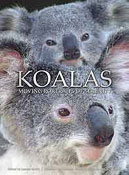
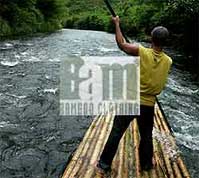
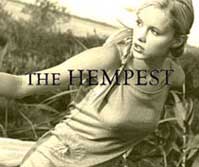
<< Home